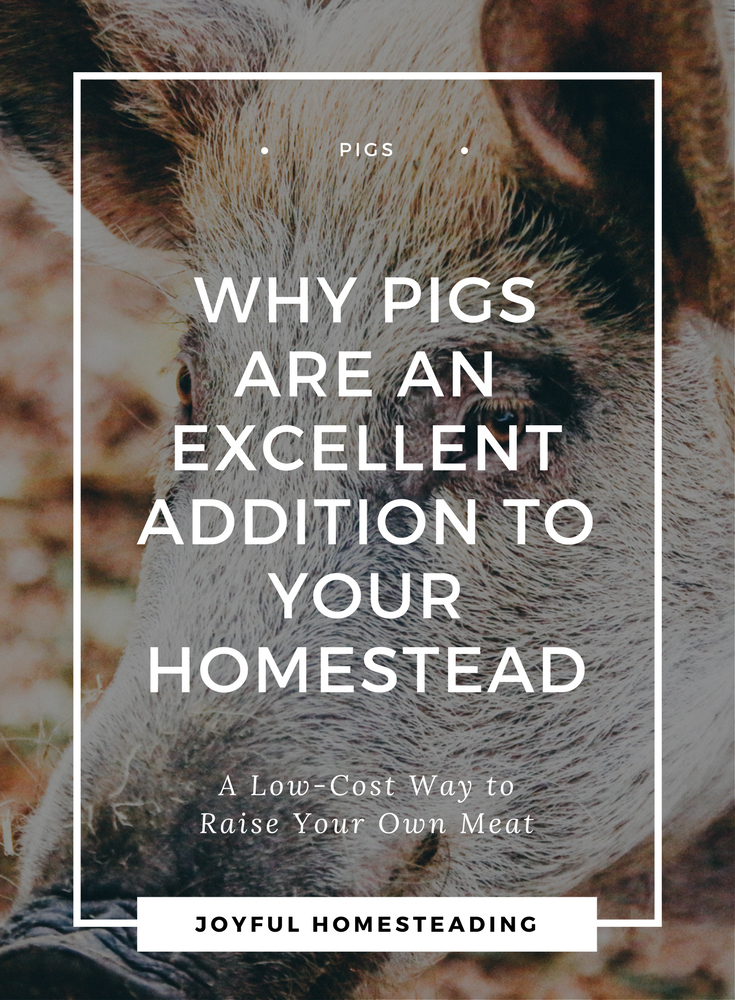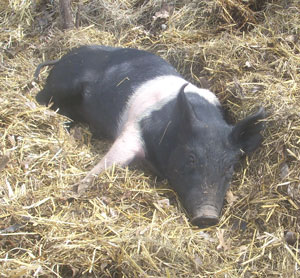Raising Pigs
Raising pigs is an excellent way to provide meat for your family at a low cost, and it's something anyone can do. There are even some who may argue that a few pigs are essential to self-reliant homesteading.

It's Easier Than You Think
Don't let the concept of raising pigs scare you. It's surprisingly easy to raise pigs, and actually much easier than dealing with goats.
They're also much safer than cows. If a cow rushes at you, you're in big trouble.
Unless it's a sow with her young, pigs are relatively safe and harmless. Dealing with them is a big like dealing with a dog, but tastier.

You will need sturdy fencing and good shoes (in case one of the big fellas step on you) and access to water, especially if you raise them in the summer.
Raising Pigs is a Low Cost Source of Good Quality Meat
Unless you're truly daring and plan on butchering them yourselves (I'm not, but I do know some intrepid souls who do), you will need to pay a processor at butchering time which will probably cost you about $100. A few years ago, we bought some baby pigs for $50 each.
Including their feed, you will probably pay about $225 total for 100 pounds of meat or a cost of $2.25 per pound. Of course, if you do butcher them yourselves, your cost is much lower.
Pigs Can Make a Homestead
Truly Self-Reliant
In order to have a truly productive garden, you need manure and lots of it. A few pigs will supply that in short order. They're also excellent in turning over your compost pile. Keep your pile in your pig pen, and they'll happily root around in the pile all day, especially if you bury a little corn in the pile daily.
Some Things to Keep in Mind When Raising Pigs
Pigs are intelligent and generally have a good nature, but you never want to be in a pen where a mama sow has her babies. In that case, make sure your fencing is sturdy and tell your children to keep away.
If you do plan on taking your finished hogs to the butcher, you're going to have a hard time getting them to get onto a trailer, unless you do this: About two weeks before you plan on taking your hogs to the processor, open the gate and put a ramp through the entrance that leads up to the trailer.
Make it so the pigs can't escape, but have access to the trailer. Then leave their food in the trailer. You will need to do this for several days before the hogs trust the ramp enough to walk up it to their food. Their intelligent and wary; only hunger will compel them.
Once they are comfortable climbing up the ramp, put their food in the trailer, wait for them to walk into the trailer and lock them in.
My husband and I didn't realize that hogs need several days, not just one or two, to get used to the ramp and trailer, and there was no way he could shove those hogs up the ramp. He ended up falling in the muck and the hogs escaped their pen, and it took us awhile to get them back in the yard. So give your hogs a couple of weeks to get used to the trailer.
Hogs Aren't Garbage Disposals
I do know of a place that serves a lot of people each day and gives the leftovers to the hogs. There are enough leftovers that they seldom have to serve the hogs feed. This will work, but the meat tastes poor. The old adage: "Quality in/quality out" is never more true than it is with raising pigs. If you want good quality meat, feed your pigs primarily pig food and throw in a few scraps.
I have heard of a farmer in South America that only feeds his pigs acorns he gathers from the property. No pig feed; no scraps; just acorns. The guy must live in a lot of woods with a lot of oak trees. In any case, the meat is supposed to be incredible and people pay a lot money for it.
Be that as it may, pigs do love acorns, so if you have a few oak trees on your property, gather the acorns and give them to your pigs.
Pigs Can Stink
Especially if you plan on raising pigs during the summer. On really hot days, I hosed my hogs off with a hose. They loved it, and it seemed to help reduce the smell. You can avoid the smell altogether if you can find some baby pigs to raise in the fall and winter.
Terms You Should Know
Farrow means to give birth.
Barrow is a male that has been castrated.
Gilt is a female under 18 months of age that has not given birth.
Shoat is a recently weaned pig.
Boar is an intact male.
Sow is any female that has had a litter of pigs.
Butcher or Market Hog is one weighing 220 to 260 pounds and ready for sale or butcher. They are between five and seven months of age.
Feeder Pig generally weighs 40 to 70 pounds and is sold to be fed out to market weight. They are generally between 8 and 12 weeks of age.
Finishing means raising or feeding a pig to market or butcher weight.
Related article: Raising chickens for meat










New! Comments
Have your say about what you just read! Leave me a comment in the box below.